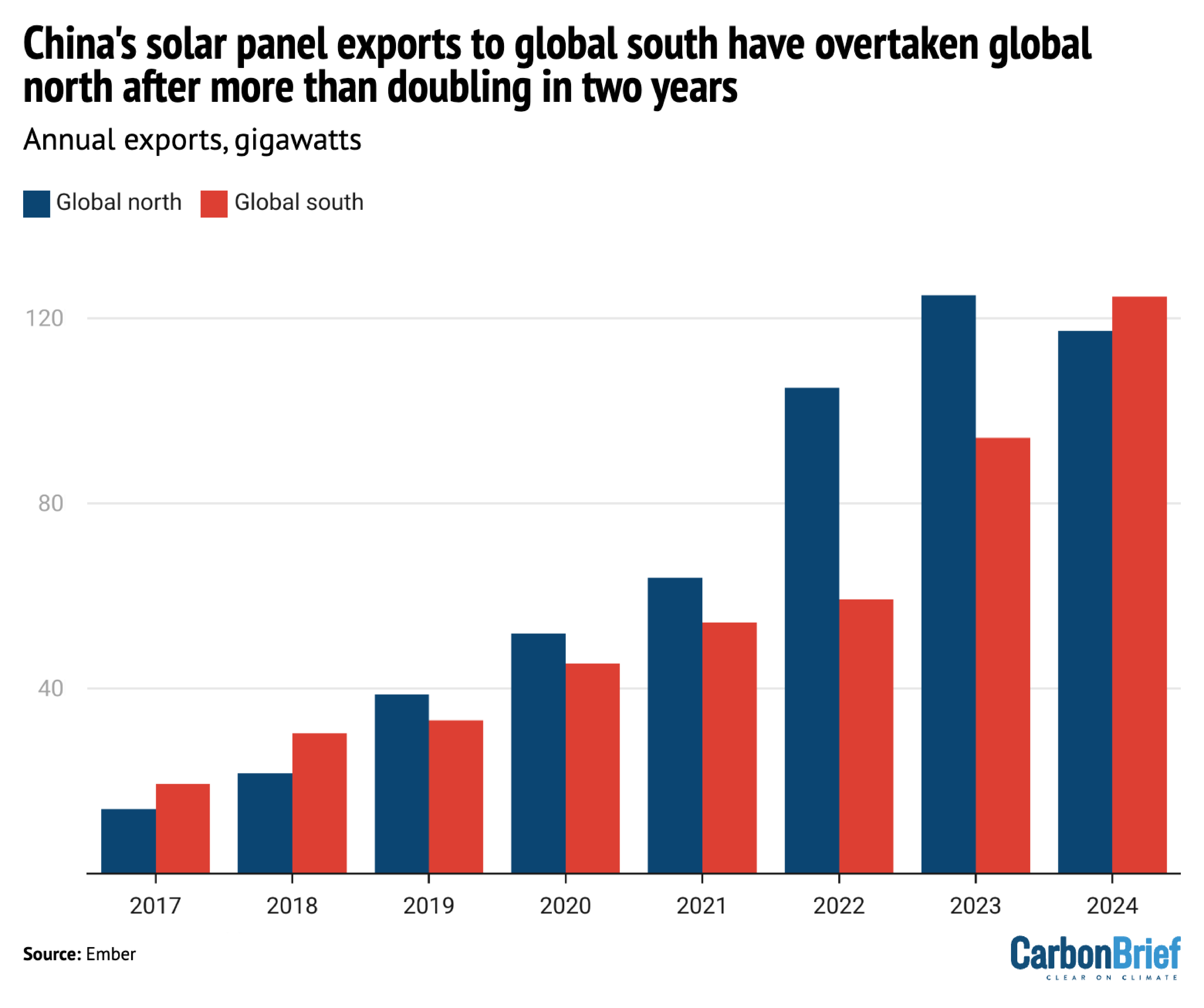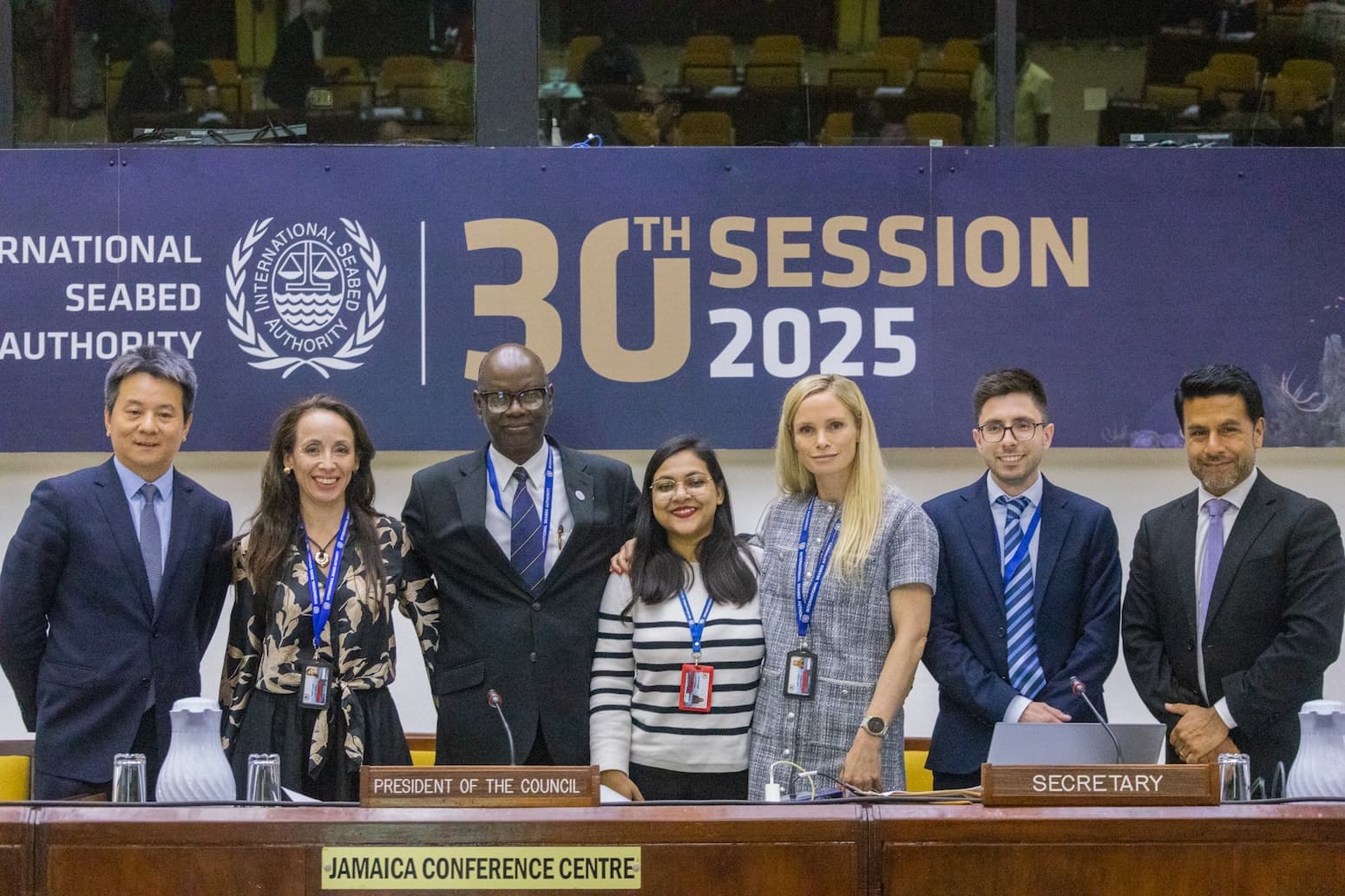
DeBriefed 4 April 2025: Scientists issue Trump ‘SOS’; EU climate goal in jeopardy; Deep-sea mining talks
Yanine Quiroz
04.04.25Yanine Quiroz
04.04.2025 | 2:08pmWelcome to Carbon Brief’s DeBriefed.
An essential guide to the week’s key developments relating to climate change.
This week
Trump ‘SOS’
‘CHAOS’ GRIPS: More than 1,900 scientists from US national academies of sciences, engineering and medicine wrote an “SOS letter” warning of the risks to science imposed by the current administration’s grant cuts and mass layoffs, reported the Guardian. The Guardian also said a “sense of chaos has gripped” the National Oceanic and Atmospheric Administration, after Trump-sanctioned layoffs have affected 20% of staff.
WEAKER STANDARDS: Trump is weighing returning to weaker car emissions standards from 2020, saying pollution limits introduced by Joe Biden are “too onerous” for motor companies, Bloomberg reported. The US transportation sector is the country’s leading source of greenhouse gas emissions.
TARIFFS TURMOIL: The New York Times said that the renewable energy industry in the US is “bracing for particularly large effects” from Trump’s ongoing tariffs war with the rest of the world. It noted that the turmoil is “expected to drive up the costs of nearly every component of clean-energy production in the US, from the steel in wind turbines to the batteries in electric vehicles”.
Around the world
- SOFTENING GOALS: EU Climate Commissioner Wopke Hoekstra is considering softening the bloc’s 2040 climate goal amid a “backlash” from some quarters, Politico said. A second Politico story reported that the release of the goal will be delayed while Hoekstra “struggles” to rally support.
- COAL STICKS: The world’s total coal-fired power “inched up” by 18.8 gigawatts in 2024, the lowest rise in two decades, with new additions in China and India continuing to offset closures elsewhere, according to Reuters coverage of a new Global Energy Monitor report.
- ASIA HEAT: Large swathes of India will experience intense heatwaves this summer with above normal temperatures expected across much of the country, the nation’s meteorological office has warned, according to BBC News.
- RENEWABLE AFRICA: Africa increased its renewable energy capacity by 6.7% last year, equivalent to 4.2GW, according to an International Renewable Energy Agency report covered by Energy Capital and Power. Egypt, Ethiopia and South Africa were among countries to build the most clean power.
40%
The percentage by which the “average person would become poorer” if the world warmed by 4C, according to an Environmental Research Letters study covered by the Guardian.
Latest climate research
- An “extraordinary” heatwave in Central Asia in March was made up to 10C hotter by human-caused climate change, a new World Weather Attribution analysis found.
- A Proceedings of the National Academy of Science study found that the limits of human heat tolerance are lower than previous estimates.
- Climate change has played a dominant role in destabilising communities of plankton, microorganisms that form the basis of the food web for marine wildlife, a new study in Communications Earth and Environment found.
(For more, see Carbon Brief’s in-depth daily summaries of the top climate news stories on Monday, Tuesday, Wednesday, Thursday and Friday.)
Captured

China’s exports of solar panels to the global south have doubled in the past two years, overtaking global-north sales for the first time since 2018, according to data from the thinktank Ember explained in a new Carbon Brief guest post. Saudi Arabia and Pakistan were among the top importers of Chinese solar panels in 2024.
Spotlight
Deep-sea mining talks
Carbon Brief explains the outcomes of the latest deep-sea mining talks held last week in Jamaica.
The deep sea has emerged as a new mining frontier in the global race towards energy security, with countries vying to explore and exploit its reserves of metals, such as nickel, copper, cobalt and manganese.
These minerals – critical to the energy transition – are held in the deep ocean’s nodules, hydrothermal vents and crusts, but the impacts of mining these deposits are still far from being fully understood.
In 2021, the Pacific island state of Nauru triggered a legal process for countries to agree rules around mining the seabed, or – in their absence – allow commercial mining of the deep sea to begin by 2025.
The UN Convention on the Law of the Sea (UNCLOS) is an international treaty that provides a framework to regulate the use of the world’s seas and oceans.
Among other bodies and orders, UNCLOS established the International Seabed Authority (ISA), which is based in Kingston, Jamaica, and oversees all resource extraction in the deep sea.
From 17-28 March this year, the ISA held the first part of its 30th annual session, with the aim of making progress on draft rules to govern commercial deep-sea mining.
Jamaica talks

The ISA said that there was “significant progress” on various aspects at the meeting and other areas that “require further deliberation”.
Some of this progress is the agreement to use the term “harmful effects” rather than “serious harm” to the marine environment, which aligns with the UN Convention on the Law of the Sea (UNCLOS), the Earth Negotiations Bulletin noted.
However, it added that there were “major issues unresolved”, related to “regulations” crucial for the protection of the marine environment, such as environmental impact assessments and the rights and interests of coastal states.
Duncan Currie, the international legal advisor to the Deep-Sea Conservation Coalition, said parties did not agree on any of the 55 reviewed regulations, but rather just discussed their positions on those regulations.
He also pointed out the lack of discussion over financial matters, liability, the royalties that are paid and the benefit sharing from deep-sea mining, telling Carbon Brief:
“There are 80 standards and guidelines that can’t be developed until [countries] have developed the regulations. I think most people think that they’re quite a long way away from being adopted.”
Current and future outlook
So far, 32 ISA member states are in favour of a moratorium on deep-sea mining, while other countries are seeking to exploit minerals in the seafloor “as soon as possible”.
Among those promoting the deep-sea mining industry are India, China and Norway, while countries such as Palau, Fiji and Samoa are promoting a “pause on deep-sea mining until its ecological impacts are better understood”, Carbon Brief previously reported.
In a surprise move that sent “alarm bells ringing” in the ISA and beyond, the US subsidiary of the Metals Company announced on 27 March that it is moving ahead with applying for deep-sea exploration permits under existing US legislation in the second quarter of 2025.
The announcement came on the last day of the ISA talks, where it dominated discussions at the end of the meeting.
On 31 March, Reuters reported that the Trump administration is “weighing an executive order” that could let miners bypass the ISA, its safeguards and “fast-track” permits. The US is not a party to UNCLOS.
Both developments signal that the ISA is “at a crossroads”, according to the Earth News Bulletin, and its next session in July will be closely watched for how the body responds to a potential unilateral action to allow deep sea-mining.
Watch, read, listen
NOT WITH SPORTS: A Discovery+ documentary explored how extreme weather is already affecting sport events.
STRENGTHENING MENTAL HEALTH: A psychologist writing in the Revelator offered strategies to reduce the effects of climate change on mental health.
FOSSIL LOBBY: Former UN climate chief Christiana Figueres and political strategist Tom Rivett-Carnac addressed the fossil fuel lobby within COPs on their Outrage and Optimism podcast.
Coming up
- 2-5 April: Global Youth Climate Summit, Belo Horizonte, Brazil
- 7 April: International Mother Earth Day
- 7-11 April: International Maritime Organization Marine Environment Protection Committee meeting (MEPC 83), London
Pick of the jobs
- Sky News, senior news editor – science, climate and technology | Salary: Unknown. Location: London
- Australian National University, postdoctoral research fellow in climate systems | Salary: AU$85,010-$131,227. Location: Canberra, Australia
- Dialogue Earth, social media officer | Salary: £36,035 per annum. Location: London
- Grantham Research Institute on Climate Change and the Environment, policy officer (adaptation policy and governance) | Salary: from £42,679-£54,730. Location: London
DeBriefed is edited by Daisy Dunne. Please send any tips or feedback to [email protected].
This is an online version of Carbon Brief’s weekly DeBriefed email newsletter. Subscribe for free here.
-
DeBriefed 4 April 2025: Scientists issue Trump ‘SOS’; EU climate goal in jeopardy; Deep-sea mining talks



